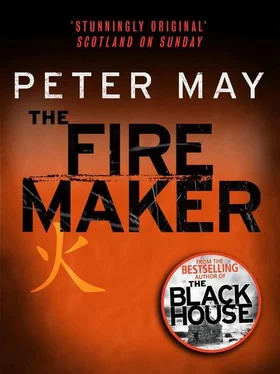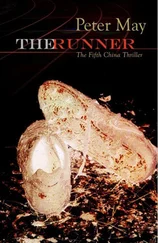‘Be not deceived; God is not mocked: for whatsoever a man soweth, that shall he also reap.’
Galations 6:7
The laughter of the children peals through the early morning quiet like bells ringing for the dead. Hair straight, dark and club-cut, bobs above the frilled white and pink of the girls’ blouses as they run along Ritan Park’s dusty paths in the gloomy green Beijing dawn. Their dark oriental eyes burn with the fire of youth. So much life and innocence a breath away from that first encounter with death, and the taint of immortality that will stain their lives for ever.
Their mother had asked the baby-sitter, a dull country girl, to take the twins to the park early, before kindergarten. A treat in the cool of the morning, before the sun would rise and bleach all colour and substance from the day.
An old man in Mao pyjamas and white gloves practises t’ai chi among the trees, slow-motion graceful, arms outstretched, one leg so slowly lifting, exerting a control of his body that he has never had of his life. The girls barely see him, drawn by the strange sounds coming from around the next corner. They run ahead in breathless anticipation, ignoring the calls of the baby-sitter asking them to wait. Past a group of people who stand reading sheets of poetry strung between the trees; past a bench with two grey-haired old ladies in carpet slippers and grey cardigans who shake their heads at such a wanton display of free spirits. Even had they been allowed, in their day bound and bleeding feet would have put a stop to it.
The sounds that draw them, like strange music, grow louder as the children turn into a large paved circle bound by a high wall. They stop and stare in open-mouthed amazement. Dozens of couples — young, middle-aged, elderly; civil servants, office workers, army officers — shuffle in bizarre embrace. All heads are turned for guidance to the steps of an ancient sacrificial altar in the centre of the circle. At the top of the steps, where once blood was spilled as an offering to the sun, a young couple all in black confidently demonstrate the steps of the cha-cha in time to music scratching out from an old gramophone.
There is such joy in all their expressions that the children stand for a moment entranced, listening to the alien melody and rhythms of the music. Their baby-sitter catches them up at last, flushed and breathless. She stops, too, and gawps bewildered at the dancers. The city is such a strange, unfathomable place. She knows she could never settle here. From the far side of the circle she sees men wielding long, silver-bladed swords in slow, deliberate acts of contained aggression, slicing the air in grotesque parody of some medieval battle. The dancers ignore them, but the baby-sitter is afraid, and she shoos the reluctant children down a path, away from the people and the noise.
But now another distraction. Smoke filtering through the leaves, descending like a mist, thick and blue. A strange smell, the baby-sitter thinks, like meat on an open fire. And then she sees the flicker of flames through the green gloom and is gripped by a sudden desperate foreboding. The children have run ahead again, scrambling up a dusty path among the trees, and ignore her calls to wait. She runs after them, a shady pavilion that overhangs the lake dropping away to her left. The wailing call of a single-stringed violin reaches her as she crests the rise through the trees and follows the children into a clearing where the flames lick upwards from a huddled central mass. The girls stand staring curiously. The baby-sitter stops. She feels the heat on her face and shades her eyes from the glare, trying to see what it is that burns so fiercely. At its heart something moves. Something strangely human. The scream that comes from the nearest girl somehow sharpens the baby-sitter’s focus, and she realises that what moved was a charred black hand reaching out towards her.
Monday Afternoon
The world tilted and the sun flashed back at her, reflected in a fractured mosaic like the pieces of a shattered mirror. Her body was telling her it was two in the morning and that she should be asleep. Her brain was informing her that it was mid-afternoon and that sleep was likely to be a distant prospect. Sleep. In twenty-one hours of travelling, it had successfully eluded her every attempt to embrace it. Although in these past weeks even sleep had provided no escape. She was not sure which was worse — the waking regrets and recriminations, or the restless nightmares. The gentle oblivion induced by the vodka tonics she had swallowed gratefully during the early hours of the flight had long since passed, leaving her with a dry mouth and a headache that swam somewhere just beyond consciousness. She glanced at the health declaration she had filled in earlier, still clutched in her hand…
WELCOME TO CHINA
FOR A BETTER & HEALTHIER TOMORROW
She had drawn a line through the space left for ‘Content of Declaration’. She had nothing to declare, except for a broken heart and a wasted life — and neither of these, as far as she was aware, was infectious, contagious, or carried in the blood.
The world tilted again, and now she saw that the dazzling mosaic of light was in fact a pattern of water divided and subdivided into misshapen squares and oblongs. The reflection of a culture five thousand years old. Green shoots of rice pushing up through the paddies to feed a billion hungry mouths. Beyond the haze, to the north, lay the dusty plains of the Gobi desert.
An air hostess walked through the cabin spraying disinfectant into the atmosphere from an aerosol. Chinese regulations, she told them. And the captain announced that they would be landing at Beijing Capital Airport in just under fifteen minutes. Ground temperature was a sticky 35 degrees. Centigrade. That was 96 degrees Fahrenheit for the uninitiated. One of countless differences she supposed she would have to get used to in the next six weeks. She closed her eyes and braced herself for the landing. Of all the means of escape she might have picked, why had she chosen to fly? She hated airplanes.
The overcrowded shuttle bus, filled with the odour of bodies that had not washed for more than twenty hours, lurched to a halt outside the terminal building and spilled its passengers into the simmering afternoon. She headed quickly indoors in search of air-conditioning. There was none. If anything, it was hotter inside, the air thick and unbreathable. She was assailed by the sights and sounds and smells of China. People everywhere, as if every flight of the day had arrived at once, passengers fighting for places in the long queues forming at lines of immigration desks. Even in this international transit hall, Margaret drew odd looks from strange oriental faces who regarded her as the strange face in their midst. And, indeed, she was. Curling fair hair held back from her face in clasps, and tumbling over her shoulders. Ivory pale skin and clear blue eyes. The contrast with the black-haired, dark-eyed uniformity of the Han Chinese could not have been starker. She felt her stress level rising and took a deep breath.
‘Maggot Cambo! Maggot Cambo!’ A shrill voice pierced the hubbub. She looked to see a square, uniformed woman of indeterminate middle age pushing brusquely through the advancing passengers holding aloft a piece of card with the name MAGRET CAMPELL scrawled upon it in clumsy capital letters. It took Margaret a moment to connect the name she saw, and the one being called out, with herself.
Читать дальше












